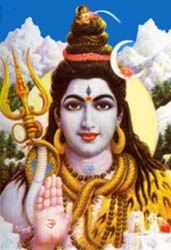|
 \English
Shri Shiva
Mahimna Stotram\ \English
Shri Shiva
Mahimna Stotram\ 
Page 4 of 16

  
(See Sanskrit, Marathi and
Comparative Mahimna)
Kimiihah
kinkaayah
sa khalu kimupaayastribhuvanam
kimaadhaaro dhaataa srijati kimupaadaana iti ca /
Atarkyaishvarye tvayyanavasaraduhstho
hatadhiyah
kutarko'yam kaamshcinmukharayati mohaaya jagatah
//5//
Paraphrase (Pr): "What
(kim)
desire (iihah)
(does)
He (fulfill)
(sáh khálu)?;
what (kim)
body (kaayah)
(does)
He (take)
(sáh khálu)?;
(and)
what (kim)
means (upaayah),
support (aadhaarah)
and material
(upadaanah)
(does)
the Creator (dhaataa)
(use for)
manifesting (srijati)
the three (trí)
worlds (bhúvanam... iti ca)?",--"iti"
stands for inverted commas and "ca"
is a mere expletive here--.
This (ayám)
fallacious way of arguing (kutarkah),
which is
(also) unwise
(duhsthah)
and inopportune
(anavasara), about You
(tváyi) and
(Your)
Sovereignty or Lordship (aishvarye)
that surpasses thought and reasoning
(atarkya),
(comes)
from a confounded person (hatadhiyah).
(This very
fallacious way of arguing)
causes some people (kaan-cid)
to speak
(resonantly) (mukharayati)
(only)
for the world (jagatah)
to lose onsciousness
and fall prey to delusion
(mohaaya). (5)
CR:
SM:
Ajanmaano lokaah
kimavayavavanto'pi jagataa-
madhisthaataaram
kim bhavavidhiranaadritya bhavati /
Aniisho vaa kuryaadbhuvanajanane kah
parikaro
yato mandaastvaam pratyamaravara samsherata ime //6//
Paraphrase (Pr): "Do
(kim)
the worlds (lokaah)
(exist)
without any origin (ajanmaanah),
even though (ápi)
they consist of parts or portions
(avayavavantah)?
Is there (kim... bhávati)
creation (vidhih)
of the worlds
(bhavá) regardless
(anaadritya)
of
(the existence)
of someone presiding
(adhisthaataaram)
over the
(above-mentioned)
worlds (jagataam)?
Or (vaa),
(if)
there is no Lord (aniishah),
what (káh)
attendant or assistant
(parikarah)
would give aid (kuryaat)
in manifesting
(janane) the worlds
(bhúvana)?" By basing
(their ideas)
on that (kind
of reasoning)
(yátah),
oh You, who are the most excellent (vará)
among the gods (amara)!,
these (ime)
dull-witted and silly people (mandaah)
raise doubts (samsherate)
about You (tvaam
práti). (6)
CR:
SM:
Trayii saankhyam yogah
pashupatimatam vaisnavamiti
prabhinne prasthaane paramidamadah
pathyamiti ca /
Ruciinaam vaicitryaadrijukutilanaanaapathajusaam
nrinaameko
gamyastvamasi payasaamarnava
iva //7//
Paraphrase (Pr):"The three Veda-s
(trayii),
Saankhya
(saankhyam),
Yóga
(yógah),
the doctrine
(matám)
of Pashupati
(pashupati)
--i.e. the
Shaiva doctrine--
(and)
the Vaisnava
(doctrine)
--pertaining
to Lord Vísnu--
(vaisnavam
iti)";
in
(these)
different
(prabhinne)
system(s)
(prasthaane)
(there are)
thus
(iti ca)
this
(idám)
and that
(adás)
way
(pathyam)
toward the Highest
(State)
(param)
--i.e. there
are various ways of realizing the Supreme Self or Shivá--. For the men
(nrinaam)
who are
devoted
(jusaam)
to multiple
(naanaa)
paths
(patha),
straight and crooked ones
(rijú-kutila),
in accordance with the variety
(vaicitryaat)
of their appetites
(ruciinaam),
You
(tvám)
are
(asi)
the only
(ékah)
goal to be attained
(gamyah),
just as
(iva)
the ocean
(is)
(árnavah)
with regard
to the waters
(payasaam)
--i.e. the water of rivers, rain, etc. ultimately flows into ocean. (7)
CR:
SM:
Page 4 of 16
(See Sanskrit, Marathi and
Comparative Mahimna)
 \English
Shri Shiva
Mahimna Stotram\ \English
Shri Shiva
Mahimna Stotram\ 
|